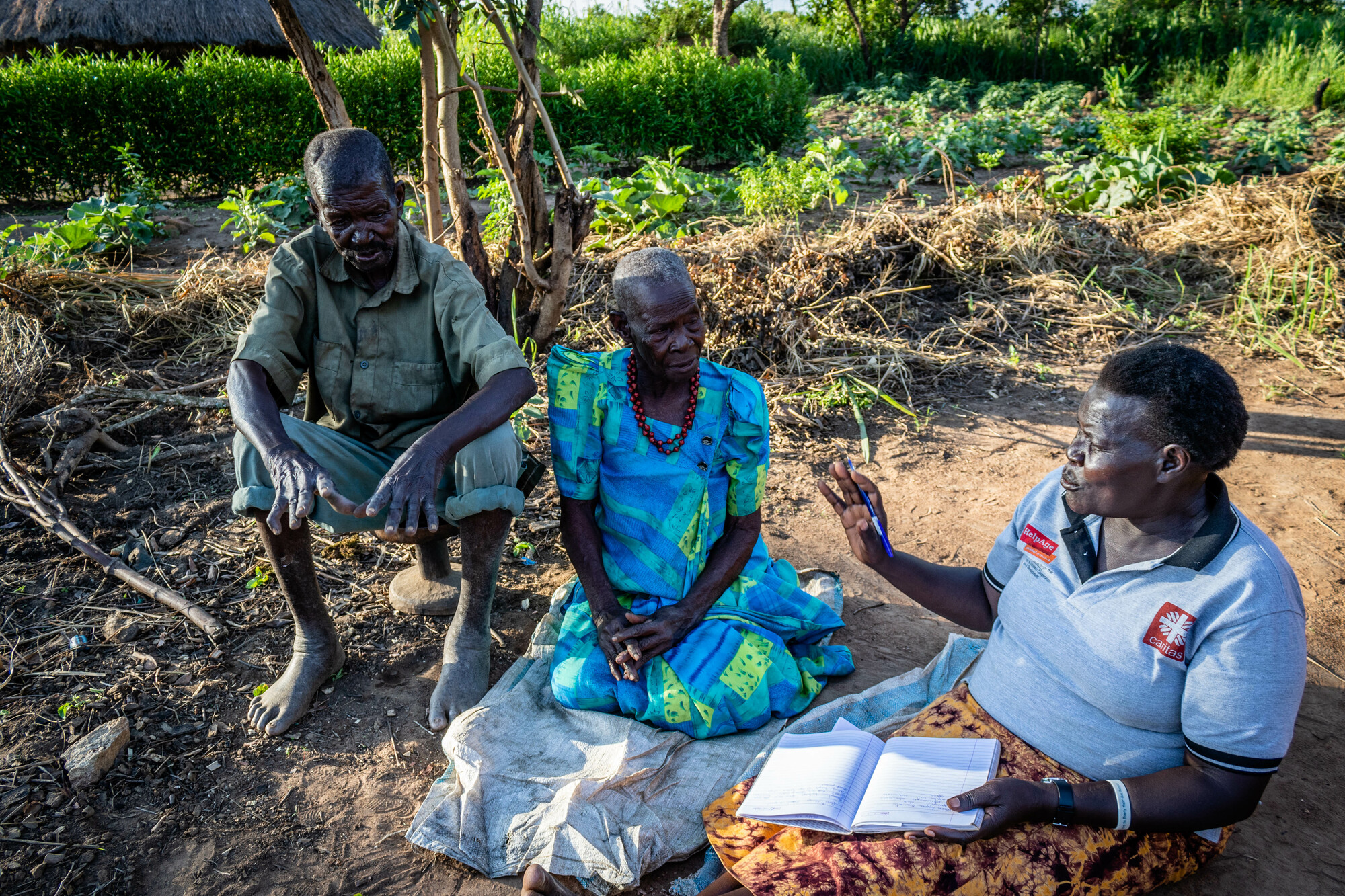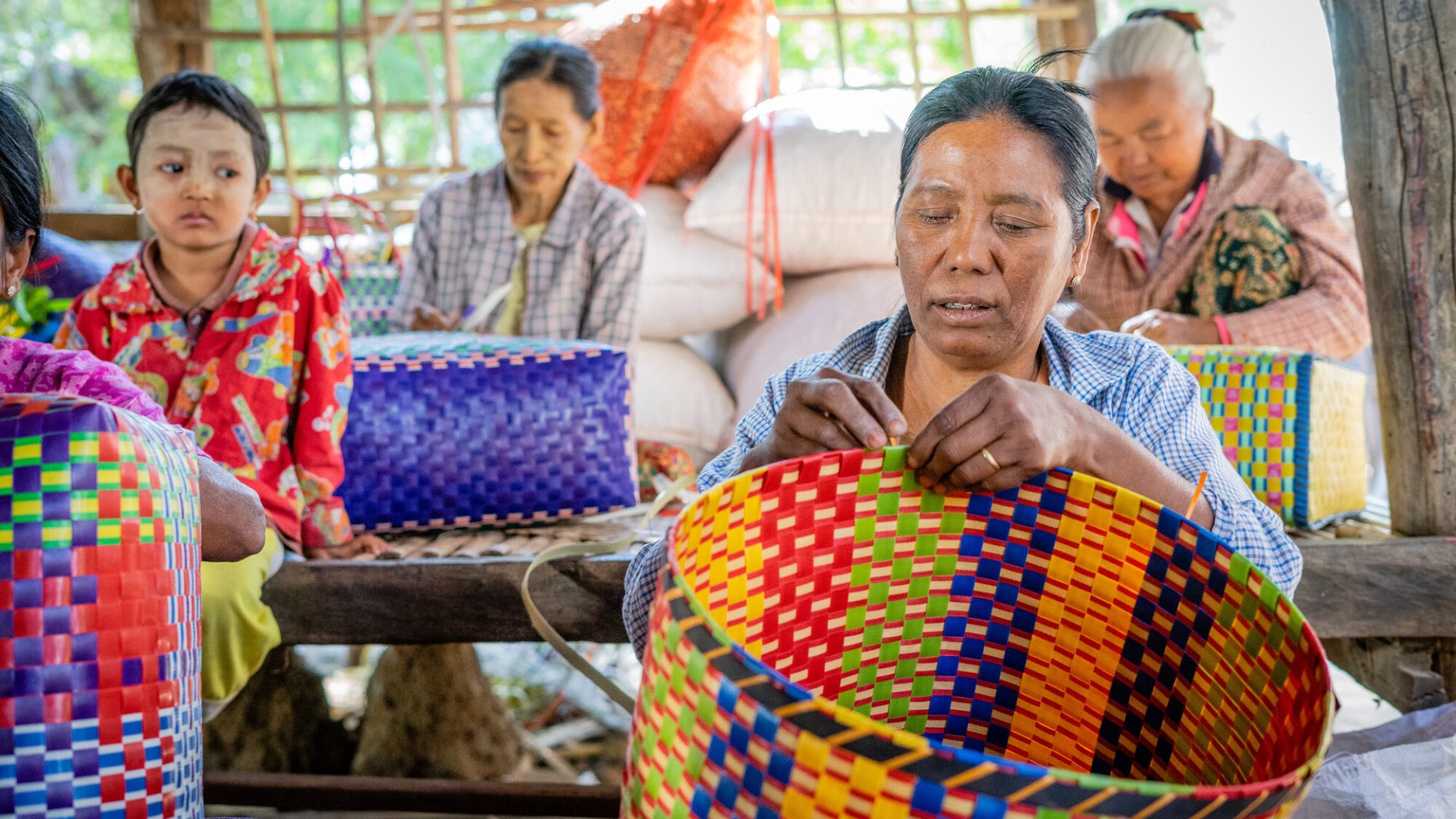Paving the way: demonstrating the impact of pensions
HelpAge’s efforts illuminated the feasibility of delivering social pensions and their broader societal impact.
Research revealed that pensions could support whole families, with older people tending to spend what little money they had on income-generating activities and the health and education of dependents. Social pensions could act as a lifeline for millions of households run by older people with children orphaned by HIV / AIDS or conflict.
Collaborations with partners strengthened HelpAge’s advocacy, amplifying access to advocate for social pensions. UNICEF worked with HelpAge to demonstrate the numbers of households with orphans that were headed by older people, supporting the case for universal social pensions and child benefits to support HIV / AIDS orphans. HelpAge began working with Save the Children because they recognised older people were looking after many of the children they were advocating for. These alliances highlighted the crucial role older people played in caring for vulnerable children, weaving a compelling narrative for change.
The Livingstone declaration: catalyst for change
In 2006, the Intergovernmental Conference on Social Protection, led by HelpAge in collaboration with the Zambian government, instigated a significant transformation. This three-day conference, endorsed by the African Union (AU), convened Ministers and high-ranking representatives from 13 African governments. The Livingstone Call to Action acknowledged social protection as an economically feasible mechanism for alleviating poverty and fostering economic advancement. It urged African governments to progress by formulating costed cash transfer plans within three years as integral components of their national development strategies.
Extensive groundwork had been laid. Each participating government had been furnished with information about their domestic circumstances, including comprehensive studies delineating the costs and impacts of social protection and cash transfer initiatives. Representatives from Brazil, Lesotho, and South Africa shared insights into their respective social protection programmes.
However, for Sylvia Beales, the policy manager at that time overseeing the conference, the standout moment was the collective visit to Zambia’s Kalomo Pilot Cash Transfer Scheme. During this visit, attendees interacted with the scheme’s administrators and, significantly, the beneficiaries themselves.
Of discussions the following day, she remembers: “One person from a government said ‘I am ashamed. I have never been to see the conditions of my people like I did yesterday’.”
It brought an energy and resolve. “I was in charge of the computer,” she says. “We had this thing on the screen and people were saying ‘I want this word’ and ‘I want that word’, so that in just three hours we had the historic declaration, which was adopted by the African Union and the Government of Zambia. It was amazing.”

Aber Uma (right) speaks with older people in Choopil, Uganda about their rights to social pension and ways to receive social assistance.
Propelling momentum: global action and impact
Livingstone played a crucial role in mobilising support. In Africa, HelpAge collaborated with the AU to organise six country meetings across three regions ahead of the global Africa meeting in Namibia in 2008. During this gathering, a new chapter on social protection was incorporated into the AU’s social policy, with the key phrase ‘the basic minimum package’ included.
This package contributed to the Social Protection Floors Recommendation, adopted by the ILO in 2012, which provided guidelines to nation states for everyone to access a basic level of social security throughout their lives. At the UN, HelpAge and the ILO successfully advocated for the inclusion of social protection and social protection floors within the targets of the first Sustainable Development Goal (SDG) to end poverty. Today, the right to social protection and the importance of social protection floors are recognised as essential in achieving all the SDGs.
Comprehensive work then unfolded across various countries. HelpAge initiated trial social cash transfer training programmes in Southeast Asia, while the social protection team, headed by Charles Knox-Vydmanov, engaged in detailed policy work with diverse countries like Nepal, the Philippines, Thailand and Vietnam to integrate social pensions into national strategies.
HelpAge’s relentless advocacy yielded positive outcomes in numerous countries, where universal pensions became a reality, including Kenya (2018), Peru (2011), Thailand (2009) and Uganda (2019). Ongoing efforts persist in other regions, including mainland Tanzania.
Smart Daniel, former programme manager for social protection in Tanzania, earned the moniker ‘Mr. Pension’ due to his advocacy for universal pensions, successfully implemented in Zanzibar in 2016. In 2023, following engagement from HelpAge’s regional AFFORD programme, the Zanzibar government increased the pension by 150% from 20,000 to 50,000 shillings a month (US$8 to US$20) to support older people facing higher prices.
Advancements in social pensions and social protection were evident elsewhere. Minimal cash transfers had been dispersed in Tete Province in Mozambique prior to the 2006 Livingstone Agreement, and, according to Janet Duffield, who joined HelpAge as Mozambique’s country director in 2005, the government was initially hesitant to expand further.
Gradually, people in Mozambique received increased cash aid, and the coverage area expanded. HelpAge collaborated with UNICEF and other entities to experiment with new social protection measures, such as grants for children under two, and facilitated the integration of social protection into governmental policies. Bilateral funding sustained cash transfers, while monitoring efforts identified and addressed barriers hindering people from accessing support.
HelpAge’s work on social pensions reshaped policies and transformed mindsets, empowering older people and emphasising their rights. Janet asserts, “HelpAge’s work on social protection was truly global. It changed programmers’, policy makers’ and public attitudes in a radical way on so many levels, as well as having a very clear impact on older people’s lives. It supported the shift towards cash for humanitarian work, it focused on rights and as such pushed forward the empowerment of older people.”
HelpAge International’s pioneering efforts in advocating for social pensions continue to this day. It has transformed policies and ignited a profound societal shift, empowering older people and nurturing a more equitable and compassionate world.


